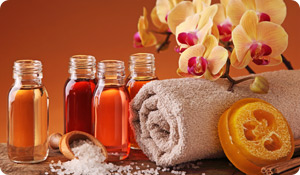
Can you sniff your way to a better mood and better health? It all depends on what scents you smell. If you surround yourself with these aromas, you might find that the secret to health is all in your nose.
Aromatherapy is a form of alternative and complementary medicine based on the use of concentrated oils from flowers, leaves, bark, branches, rinds, or roots of plants with purported healing properties. The oils are mixed with other oils (like soybean or almond oil) or diluted with water or alcohol, then sprayed in the air, rubbed on the skin, inhaled, or released into the air by burning a candle or incense. Practitioners of aromatherapy believe that the aroma these oils produce can stimulate the brain to promote healing and wellbeing. According to the National Association for Holistic Aromatherapy, "It is a natural, non-invasive modality designed to affect the whole person, not just the symptom or disease and to assist the body's natural ability to balance, regulate, heal, and maintain itself by the correct use of essential oils."
The University of Maryland Medical Center says, "Researchers are not entirely clear how aromatherapy may work....The "smell" receptors in your nose communicate with parts of your brain (the amygdala and hippocampus) that serve as storehouses for emotions and memories. When you breathe in essential oil molecules, some researchers believe they stimulate these parts of your brain and influence physical, emotional, and mental health....Other researchers think that some molecules from essential oils may interact in the blood with hormones or enzymes."
Aromatherapy has been around for thousands of years. Many of the products we use daily are scented with ingredients that mimic the aromas of pure essential oils. For example, you've probably purchased dozens of products scented with lavender, which is used in aromatherapy for sleep, relaxation and stress relief.
What other scents should you surround yourself with? Here are 15 we think you'll like:
- Allspice. For arthritis, muscle pain, nausea and for aphrodisiac purposes
- Bergamot. For anxiety, stress, acne and other skin conditions.
- Cinnamon. For constipation and stress
- Eucalyptus. For colds, sinuses and coughs
- Frankincense. For anxiety, asthma and stretch marks
- Ginger. For muscle aches and nausea
- Jasmine. For depression and fatigue
- Lemon. To relieve depression and brighten your mood
- Melissa (lemon balm). For anxiety, hypertension, and insomnia
- Nutmeg. For arthritis, circulation and digestion
- Peppermint. To improve memory and alertness
- Rose. To relieve depression, insomnia and grief
- Sandalwood. For skin conditions and cold symptoms
- Vanilla. To enhance other aromatherapy fragrances
- Ylang-Ylang. For anxiety, depression, and stress
Consult with an aromatherapist before mixing and matching your own scents, since some oils are contraindicated for some health conditions. Some oils should not be applied to the skin and others might react to the sun, so do your research before treating yourself.
Sources:
University of Maryland Medical Center
Aromatherapy
http://www.umm.edu/altmed/articles/aromatherapy-000347.htm
National Association for Holistic Aromatherapy
http://www.naha.org/
The Illustrated Encyclopedia of Essential Oils
Julia Lawless
Rockport, MA: Element Books, 1995





